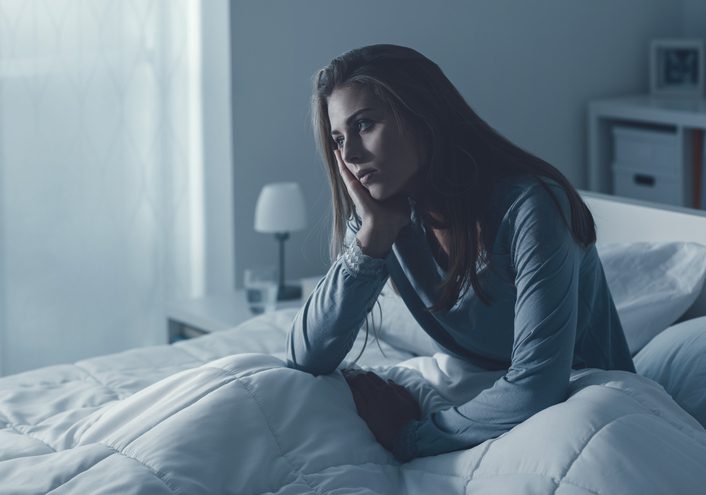Do you experience higher levels of anxiety in the evening?
There is a good chance that you, like many others, find nighttime to be the part of your day during which you feel most anxious. That anxiety can disrupt your ability to get the rest you need—and that can be the beginning of a negative cycle. Increased anxiety and sleep difficulties can build on one another, threatening your physical and mental health as well as your sobriety.
Why Anxiety Comes Calling at Night
A recent piece in the New York Times explores nighttime anxiety and its sources. The article suggests that feeling anxious at night has a long, long history:
“There’s an evolutionary purpose to evening anxiety,” said Dr. Rafael Pelayo, a clinical professor of psychiatry and behavioral sciences in sleep medicine at Stanford Medicine and author of the book, How to Sleep. “Sleep is the most dangerous thing we can do,” he said, and being hyper-aware of our surroundings allowed our ancestors to spot any incoming threats.
The article also considers another reason why anxiety may be worse as we prepare to go to bed:
“Anxiety can surface at any time, but there are a few reasons it may feel more intense at bedtime,” said Candice Alfano, director of the Sleep and Anxiety Center of Houston at the University of Houston. “Most of us are incredibly busy during the waking hours; our attention is pulled in many different directions, so we have limited time to think about our worries,” she said. “But at night, while we lie in bed, there are few distractions from the thoughts that make us anxious.”
That, as we have noted, can lead to a significant and ongoing problem:
This can lead to a frustrating conundrum: We can’t sleep because those anxious thoughts are making us think we are unsafe, which makes us more alert by raising our heart rates and tightening our muscles.
Essentially, the body can’t quite tell if the source of our troubles is a physical threat, like a tiger about to pounce, or an upcoming presentation you’re nervous about making at work — it just gets the memo to stay awake.
Drugs and Alcohol are not a Good Approach for Addressing Anxiety
If you are experiencing a lot of anxiety at night and you just cannot get to sleep, your sobriety may be in danger. It may seem like it would just be easier to have a drink or two or to take some downers in an effort to shut off your racing mind so you can fall and stay asleep.
Of course, that is not the best move at all—but in the moment it can seem like turning to drugs or alcohol is the only way to find relief.
Fortunately, there are plenty of other ways to tamp down nighttime anxiety. They include:
- Developing a nighttime routine that signals to your body and brain that it is time to rest.
- Avoiding caffeine in the afternoon and evening so that the stimulant is not contributing to your inability to fall asleep.
- Writing in a journal—which might take the form of a gratitude journal or a place to write down your swirling thoughts so you can set them aside for the night.
- Practicing mindfulness or listening to relaxing music or sleep stories designed to help you drift off.
It is also a good idea to talk with your doctor and/or therapist about any sleep difficulties—especially those related to anxiety—that you may be experiencing. Getting the rest you need is absolutely foundational to your ongoing sobriety.
Cross One Worry Off Your List: We Can Help You Regain Your Sobriety
When you are struggling with drugs or alcohol, it can seem like there is no solution to your problem. Continuing to use drugs or alcohol has devastating impacts on your physical and mental health—and so do the withdrawal symptoms that can accompany any effort to stop.
Being stuck between that rock and hard place is a sure source of anxiety.
But there is good news. At Bel Aire Recovery Center in Kansas, we can see you through the rigors of withdrawal via our medically supervised approach to detoxification. And we follow that up with a rehabilitation program that provides strategies and resources for staying sober while also addressing co-occurring mental health disorders like anxiety.
You can set your worries aside and rest easy once you decide to get the help you need to regain and maintain your sobriety.




